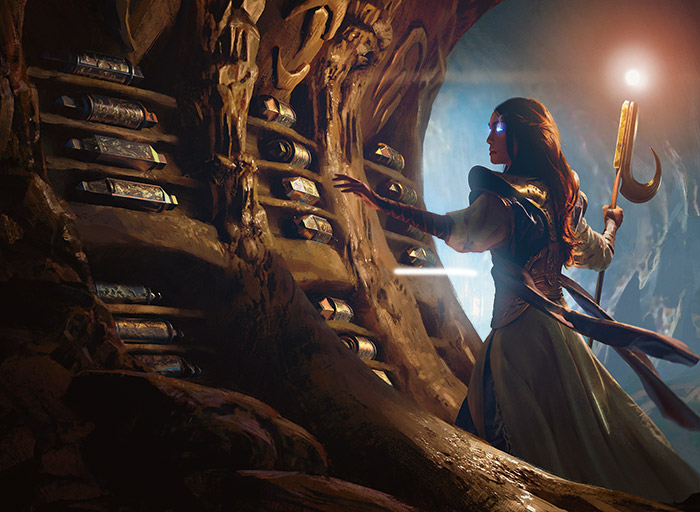Play or Draw?
The same question begins each and every game of Magic. So it makes sense that each and every player ought to be able to give an educated answer for it.
The player who goes first skips his or her first draw step, but the player who goes second does not. There are advantages to either decision. So, would you like to play first or draw first?
To play first is to make the popular choice. If you choose to play first 100% of the time, you'll rarely be making a mistake. In the corner cases where you might be making a mistake, you're making a very, very small one. So I'll save us some time and headache: you want to play first.
But don't stop reading just yet! It's important to understand the reasons behind the decision. Even more, it's important to understand how whether you're on the play or on the draw can change the dynamics of the rest of the game.

Learn from the Past | Art by Chase Stone
The Advantages of Being on the Play
The advantages of going first are often quite large, resulting in a much higher than 50/50 chance to win the game, if all other factors are equal. Being on the play offers a substantial tempo advantage that's typically well worth skipping your first draw step. For refreshers on tempo and its many important consequences, see "Tempo" and "Tempo & Card Advantage: A Delicate Balance."
The player who goes first is much more able to take the initiative, taking the game where he or she wants it to go, and forcing the opponent to react. The player who goes second will need to do something quite special in order to take back the initiative.
Moreover, there's nothing in Magic to guarantee that both players get the same number of turns in a game. Quite the opposite. The fact that the player going first has a substantial advantage more often than not means that the game will end on his or her turn (in his or her favor). Looking at a game where one player gets six turns and the other only gets five, it's easy to see the advantage in being on the play.
The advantages of going first are magnified based on the speed and power level of the format. As a game goes long, the advantages of going first begin to dissipate, but if the game ends quickly they're rather massive. Consider that, as the number of total turns played becomes smaller, getting one extra turn is more important (the ratio of four turns to three turns is larger than the ratio of eleven turns to ten turns, for example).
Being on the play or the draw is sometimes fairly unimportant in Limited, but can mean life or death in fast formats like Modern and Legacy.

Mountain | Art by Titus Lunter
The Advantages of Being on the Draw
Relatively speaking, the advantages of being on the draw are smaller and more subtle. Always remember, you're drawing first, not necessarily drawing extra. However, getting to draw a card on your first turn does mean having more total resources to work with on each of your turns.
Two consequences of this deserve special attention.
The first is that it's easier to make your land drops. (More cards simply means more chances to have a land.)
The second arises when the game boils down to waiting for one player to draw a certain card or type of card. A good example is a creature standoff where each player is waiting to draw something to break the stall. In such a case, you'll draw what you need a half turn sooner if you were on the draw than if you were on the play.
If your deck is prone to such issues, you can take some advantages from being on the draw. If you need to hit a lot of land drops but don't have a lot of card advantage, being on the draw might be helpful. If you need to draw a certain card or combination of cards before your deck really gets moving, being on the draw might be helpful. In other words, if you have a slow deck, being on the draw might be helpful.
It's also better to be on the draw if you have a bad hand. If you mulligan to four, you prefer to be on the draw. If you keep a one-land hand, you prefer to be on the draw. If your draw is slow and you need to hit lots of land drops before you can do anything relevant, you prefer to be on the draw.
The trouble, of course, is that you don't know what each player's hand is going to look like until after you've chosen either to play first or to draw first. This fits with the issue of speed and power, mentioned above. In formats where the decks are faster and more consistent, the advantages of being on the draw are not likely to be important. In a format like Sealed Deck, however, where a shaky mana base and a low power level might lead players to be slower out of the gates, these advantages could prove helpful.

Island | Art by Florian de Gesincourt
Quantity of Mana on the Play and the Draw
One interesting question is that of mana on the play and the draw. On the draw, you have more resources and are more easily able to hit your land drops. However, on the play, you get to take your turns and play your lands before your opponent, perhaps getting one more total turn than him or her.
If you were to oversimplify and say that your goal in a game of Magic was to spend as much total mana as possible, would you choose to play or to draw? Let's look at a sample game that I've fabricated for no reason other than to illustrate the question.
Johnny is on the play:
Turn 1 he plays a Mountain and taps it for mana… (1 total mana)
Turn 2 he plays a Mountain and taps both for two additional mana… (3 total mana)
Turn 3 he plays a Mountain and taps all three for three additional mana… (6 total mana)
Turn 4 he misses his land drop and taps his Mountains for three additional mana… (9 total mana)
Turn 5 he does the same… (12 total mana)
Jenny is on the draw:
Turn 1 she plays an Island… (1 total mana)
Turn 2 she plays an Island… (3 total mana)
Turn 3 she plays an Island… (6 total mana)
Turn 4 she plays an Island… (10 total mana)
Except for a brief moment on Jenny's fourth turn, at every single point in the game, Johnny has spent an equal or greater total amount of mana than her. If the game is relatively short, the mana advantage goes to Johnny. If the game drags on longer, Jenny might catch up, in part because the fact that she drew first gives her a better chance of hitting more land drops.
There are many, many variables to consider in this question. Some include: how long the game lasts, the number of lands in each player's deck, their respective mulligan tendencies, and their ability to successfully use every available mana every turn.
The question is far too complex to make a blanket statement that will always hold true. However, it is fairly clear that the player who goes first will have the advantage in terms of mana quantity at most points throughout the early game. If the game goes long, the player on the draw has a chance (but not a guarantee) of catching up.
And again, it's a question of how good each player's hand is. If both players make their land drops and have spells to cast each turn, it's better to be on the play. If one player mulligans or misses land drops, it may be safer to be on the draw.
I've found this to be a rather important question in Khans of Tarkir Limited. The keyword abilities morph, outlast, and delve—combined with plenty of other activated abilities and lands that enter the battlefield tapped—make decks hungry for a large quantity of mana. Even slow decks that play for the late game (the ones that would normally take more advantage from drawing first), can make great use of an extra turn's worth of mana. You do want the best chance of hitting your land drops, but I've generally found that giving up the chance to play first is too high of a cost.
A Zero-Sum Game
A zero-sum game, also called a strictly competitive game, is played between two opponents and results in one winner, who takes everything, and one loser, who gets nothing. Tournament Magic is a zero-sum game.
What's good for one player is bad for his or her opponent. If your chance to win the game increases by ten percentage points, then your opponent's chance to win the game decreases by ten percentage points. A positive effect on one side implies a negative effect on the other side, and the two must always sum to zero.
This all might seem rather obvious, but is not always intuitive when you're in the midst of a game of Magic. When you're focused on playing your own game, it's easy to forget that causing something bad for your opponent can be even better than following through with your own plan.
This is why, even if you are playing with a slow deck that might take some advantages from being on the draw, you should still usually choose to play first! If your opponent has a fast deck, you need to take the play away from your opponent.
If Johnny chooses to play first in Game 2, and Jenny chooses to draw first in Game 3, then one of the two players has almost certainly made a mistake. It's impossible for both players to benefit equally from Johnny going first.
Choosing to Draw
This is the real reason why it's correct to play first in such an overwhelming majority of cases. Being on the play has the potential to yield quite a large advantage under the right circumstances, but being on the draw can only ever yield a relatively small advantage. Therefore if either player has the potential to benefit from being on the play, both that player and the opponent should choose to play first. Moreover, if you're unsure of what to do, it's far, far safer to choose to play first.
All that said, there can exist a perfect set of circumstances where it is in your best interest to choose to draw. The following must all be true:
- The chances of either player achieving a substantial long-term advantage via an early-stage tempo advantage are low.
- One or both players need a lot of resources to operate. (For example, they need a lot of land drops for their expensive spells or to meet their demanding colored-mana requirements.)
- Total quantity of mana is not a limiting factor in either player's game plan. (Note the distinction here between mana and lands. Drawing first helps you make your land drops, but playing first gives you an extra turn with which to spend your mana.)
- The game is likely to go long.
Such circumstances come up regularly in Sealed Deck (although not always, and perhaps not even a majority of the time), they come up occasionally in Booster Draft, but they almost never come up in Constructed. I have chosen to draw first in Constructed before, but only under the most extreme and unlikely conditions.

Anticipate | Art by Lake Hurwitz
If you had been unsure of whether you should play first or draw first, take my advice and choose to play first. If you had been choosing to play first already, then I hope I've been able to articulate some of the reasons why it's the right thing to do. If you're playing a fast deck, enjoy the tempo advantage of getting ahead of your opponent right away. If you're playing a slow deck, then take that opportunity away from your opponent, and make him or her play the game you want to play!
However, as you begin to master Sealed Deck and Booster Draft, also keep your eyes open for those times when it might be in your best interest to choose to draw instead. The advantage you stand to gain might be small, but the small advantages are what add up in Magic.

